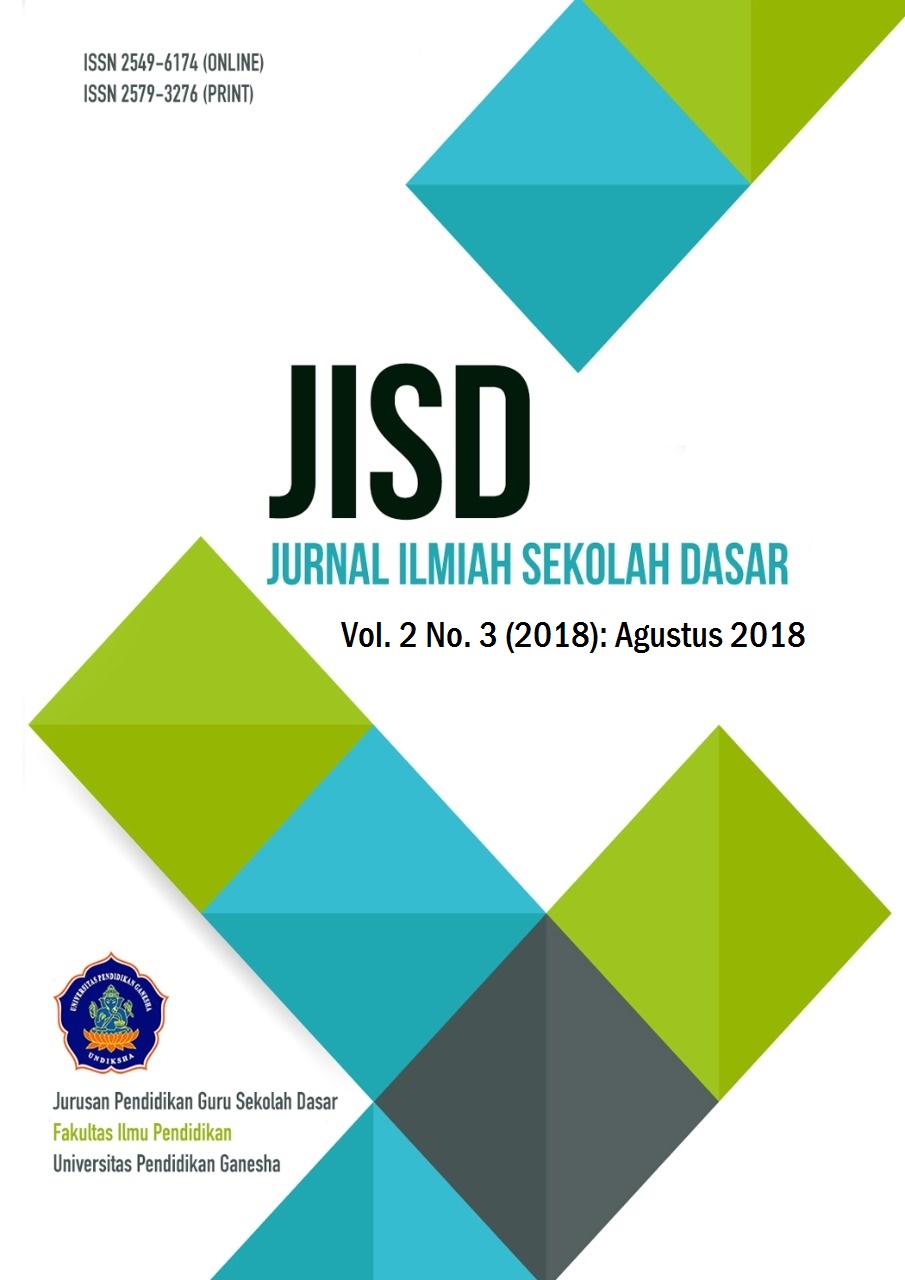Pengaruh Model Pembelajaran Reciprocal Teaching Berbasis Penilaian Kinerja Terhadap Kompetensi Pengetahuan IPA
DOI:
https://doi.org/10.23887/jisd.v2i3.16143Abstract
This study aimed to know about the affect of reciprocal teaching model based on performance assessment againts the competence science knowledge of fourth grade students of elementary school Gugus I Gianyar district in 2017/2018. This research type is quasi experiment research with nonequivalent control group design. The population of this study is all students of class IV elementary school Gugus I Gianyar district which 440 students. Sample were taken by random sampling technique, so that the IVA class in elementary school 7 Gianyar as the experimental group and the IVB class in elementary school 6 Gianyar as the control group with the total students in each group of 30 students. The data collection was done by the test method, the type of test was the usual multiple-choice objective test. The data obtained were analyzed using t-test analysis of separated variance. The result of data analysis is tcount = 7.067> ttable = 2,000 at 5% significance and dk = 58, then H0 is rejected and Ha accepted. The average value of science knowledge competence of the experimental group X ̅ = 0,46 , while average science knowledge competence of control group X ̅ = 0,26. Based on the results of this research, it can be concluded that the Reciprocal Teaching learning model based on performance assesment affect the knowledge competence of science students fourth grade students of elementary school Gugus I Gianyar districts year 2017/2018References
Agung, A. A.G. 2006. Evaluasi Pendidikan. Singaraja: Institut Keguruan Dan Ilmu Pendidikan Negeri Singaraja.
Agung, A. A. G. 2014. Metodologi Penelitian Pendidikan. Yogyakarta: Aditya Media Publishing.
Agung, A. A. G. 2016. Statistika Dasar untuk Pendidikan. Yogyakarta: Deepublish.
Arikunto, Suharsimi. 2015. Dasar-dasar Evaluasi Pendidikan. Jakarta: Bumi Aksara.
Ariyasa, I Gd. 2014. “Pengaruh Model ¬Pembelajaran Reciprocal Teaching Terhadap Hasil Belajar IPA Siswa Kelas V SD Negeri 1 Tulamben”. E-journal. Jurusan Pendidikan Guru Sekolah Dasar . Volume 2, Nomor 1 (hlm 1- 4), diakses tanggal 08 Februari 2018.
Cahyono, Tri. 2015. Statistik Uji Normalitas. Purwekerto: Yayasan Sanitarian Banyumas.
Dantes. 2012. Metode Penelitian.Yogyakarta: Penerbit Andi.
Dantes. 2017. Desain Eksperimen dan Analisis Data. Depok: Rajawali Pers.
Huda, Miftahul. 2016. Model-model Pengajaran dan Pembelajaran. Yogyakarta: Pustaka Pelajar.
Kunandar. 2014. Penilaian Autentik (Penilaian Hasil Belajar Peserta Didik Berdasarkan Kurikulum 2013). Jakarta: Rajawali Pers.
Kurniasih dan Berlin Sani . 2017. Ragam Pengembangan Model Pembelajaran Untuk Peningkatan Profesionalitas Guru. Surabaya: Kata Pena.
Lestari, dkk. 2017. Penelitian Pendidikan Matematika. Bandung: Refika Aditama.
Mahayanti, Gst. A. Md, dkk. 2013. “Pengaruh Model Pembelajaran Reciprocal Teaching Berbantuan Mind Mapping Terhadap Pemahaman Konsep IPA Siswa elas IV Semester II SD No 1 Baktiseraga”. Jurnal Pendidikan Mimbar PGSD Universitas Pendidikan Ganesha Jurusan PGSD, Volume 1, No 1(hlm 4,) diakses tanggal 10 Februari 2018.
Peraturan Menteri Pendidikan dan Kebudayaan Republik Indonesia Nomor 57 Tentang Kurikulum 2013 Sekolah Dasar, 2014. Jakarta: Kemendikbud.
Samatowa, Usman. 2011. Pembelajaran IPA di Sekolah Dasar. Jakarta Barat : PT Indeks.
Setyosari, Punaji H. 2015. Metode Penelitian Pendidikan dan Pengembangan. Jakarta: Prenada Media Group.
Shoimin, Aris. 2014. 68 Model Pembelajaran Inovatif dalam Kurikulum 2013. Yogyakarta: Ar-ruzz Media.
Suastra, I Wayan. 2017. Pembelajaran Sains Terkini. Singaraja: Universitas Pendidikan Ganesha
Sugiyono. 2016. Statistikia untuk Penelitian. Bandung: Alfa Beta.
Sugiyono. 2017. Metode Penelitian. Bandung: Alfabeta.
Uno Hamzah B dan Satria Koni, 2012. Assessment Pembelajaran. Jakarta: Bumi Aksara
Downloads
Published
How to Cite
Issue
Section
License
Authors who publish with the Journal Ilmiah Sekolah Dasar agree to the following terms:
- Authors retain copyright and grant the journal the right of first publication with the work simultaneously licensed under a Creative Commons Attribution License (CC BY-SA 4.0) that allows others to share the work with an acknowledgment of the work's authorship and initial publication in this journal.
- Authors are able to enter into separate, additional contractual arrangements for the non-exclusive distribution of the journal's published version of the work (e.g., post it to an institutional repository or publish it in a book), with an acknowledgment of its initial publication in this journal.
- Authors are permitted and encouraged to post their work online (e.g., in institutional repositories or on their website) prior to and during the submission process, as it can lead to productive exchanges, as well as earlier and greater citation of published work. (See The Effect of Open Access)










